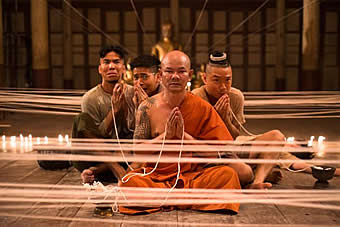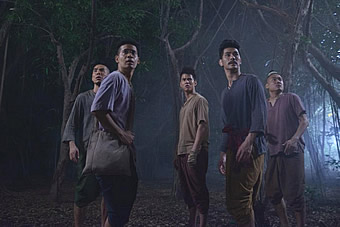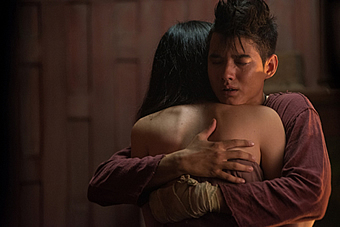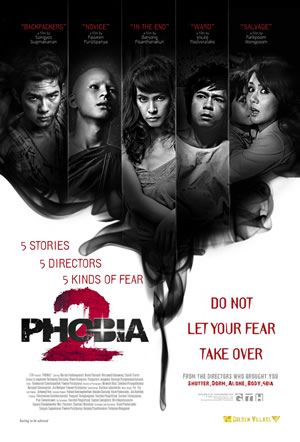PEE-MAK (2013)
Genre: Horror/Comedy
Director: Banjong Pisanthanakun
Cast: Mario Maurer, Davika Hoorne, Nuttapong Chartpong, Pongsatorn Jongwilas, Attharut Kongrasri, Kantapat Permpoonpatcharasuk
RunTime: 1 hr 52 mins
Rating: PG13 (Some Disturbing Scenes)
Released By: GV
Official Website:
Opening Day: 13 June 2013
Synopsis: PEE MAK, which is a spin-off from the well-known Thai movie NANG NAK, tells a legendary story of Pee Mak and his ghost wife Nak. During beginning of Rattanakosin Dynasty, many Thai men were drafted to serve war. Mak was no exception and had to leave his pregnant wife Nak to join the fight. When war was over, Mak invited his four best friends who he bonded during war to visit his home town and introduced his beautiful wife to them. However there was a rumor that Mak’s wife Nak had died giving birth to her stillborn baby. Is Nak really dead or was it just a rumor? How will Mak choose in the end between reality and love?
Movie Review:
You’ve probably heard of or seen one of the many adaptations of the classic Thai ghost story “Mae Nak Phra Khanong” about a soldier who returns home from war to his wife and baby not knowing that both are in fact already dead. What then makes this version by co-writer/ director Banjong Pisunthanakun (of “Shutter” and “Alone” fame) so special for it to become no less than the highest grossing movie ever in Thai cinema history?
Well for starters, it isn’t a horror movie in the traditional sense of the genre. Whereas Nonzee Nimibutr’s 1999 film “Nang Nak” stuck to the roots of the story, Pisunthanakun approaches the familiar folk tale with the same tongue-in-cheek attitude as his shorts in “4Bia” and “Phobia 2”. Yes, it’s a comedy-horror more than a straight-out horror, and the fact that we have labelled it a comedy first and a horror second should give you an idea which the film is more of.
Indeed, Pisunthanakun lets you know right from the start that he intends to entertain you, more than scare you. After a brief glance of the pregnant Nak (played by Thai-Belgian actress Davika Hoorne) doubling over in pain as blood trickles down her legs, the scene switches quickly to the inside of a tentage where a soldier is giving an impassioned speech lamenting about the cost of war – except that he seems to be speaking in Shakespearean in an attempt to add gravitas.
Just as quickly, his buddy Puak (Pongsatorn Jongwilak), whose hair is styled like a pair of wings above his head, chastises him for speaking in an accentuated manner. As the camera pans around to reveal the rest of the people in the room, you know better than to take the entire scene seriously. Besides Puak, there is Ter (Nattapong Chartpong), Aye (Kantapat Permpoonpatcharasuk), and Shin (Wiwat Kongrasri), all of whom form the quartet who brought the laughs in Pisunthanakun’s earlier “4Bia” and “Phobia 2” shorts.
And then there is Pee Mak (Mario Mauer), who is brought into the room screaming in pain but who has really merely sprained his ankle. One deliberately overdramatic battle scene later, Pee Mak and his buddies are headed back to the former’s home village of Phra Khanong for him to be reunited with his family. There, entranced by Nak’s beauty, Puak convinces the rest of them to accept Pee Mak’s hospitality and stay in the empty house across the river from theirs.
Shin is the first to suspect something is amiss when the entire village avoids Pee Mak like the plague when he goes to the market the next morning. Only the lady owner of the liquor store gives some hint why – Nak has been dead for some time and her spirit has been haunting the village since. Though the rest of his buddies dismiss his suspicions initially, Ter begins to realise that there might be some truth to Shin’s accusations when he chances upon a body buried in the forest with Nak’s wedding ring around its finger while taking a dump.
Pisunthanakun and his fellow screenwriters, Chantavit Dhanasevi and Nontra Kumwong, have great fun in the first half of the movie with Shin and Ter’s attempts to convince Aye and Puak of Nak’s ghostly nature and then with their combined efforts to let Pee Mak see the truth. In particular, their game of charades as well as their subsequent decision to kidnap Pee Mak when he and Nak are inside a “haunted house” at the village fair is utterly hilarious, qualifying as two of the most inspired comedic sequences we’ve seen this year.
Just as deftly, the second half of the movie further plays with audience expectations of just how dead or alive the rest of the characters are – we all know Nak is probably a ghost, but what about Pee Mak or for that matter the rest of his friends? Equally memorable as the two aforementioned scenes is that of the six of them on a long-tail boat in the middle of the river, the urgency of keeping the boat afloat due to excess weight and determining just who among them is or are ghosts combining for a hysterical but also a hysterically funny time.
Though purists might object to the creative liberties that Pisunthanakun has taken with the tale, he returns to its touching core during the climax set inside a Buddhist temple. Yes, if it isn’t yet apparent, the tale of Mae Nak is also meant to be a moving fable about undying love, and Pisunthanakun goes for a melodramatic but still heartfelt conclusion that reiterates the message at the heart of every retelling. Oh but of course, he does reject its tragic overtones, ending off with a postscript that is guaranteed to leave you with a big smile.
Such a revisionist take requires that his cast be absolutely clear about what each scene is meant to accomplish, no small feat considering how Pisunthanakun alternates from comedy to horror to romance within the very same scene. Thankfully, he has four actors with such great timing that you won’t sense any jarring change in tone; instead, you’ll probably be so enraptured by their seemingly effortless chemistry. Yes, Mauer and Hoorne might play the titular characters, but it is these four goofballs that make the proceedings such an unbridled delight.
There’s little wonder, when watching ‘Pee Mak’, why the movie has surpassed even the most modest of expectations to become the top-grossing hit in its home country. Rather than yet another straight-up telling of the tale, this is a surprisingly lively and inspired interpretation that makes no apologies for being deliberately anachronistic and downright irreverent, with pop-culture references from David Blaine to Ang Lee to Spiderman and even 300. Like we said, this is not your run-of-the-mill Thai horror, but a laugh-out-loud crowdpleaser that is surely one of the most entertaining Thai movies we’ve seen in a long time.
Movie Rating:




(Deliberately anachronistic and hilariously irreverent, this tongue-in-cheek retelling of the classic folk story is comedy-horror at its best)
Review by Gabriel Chong
You might also like:

Movie Stills








